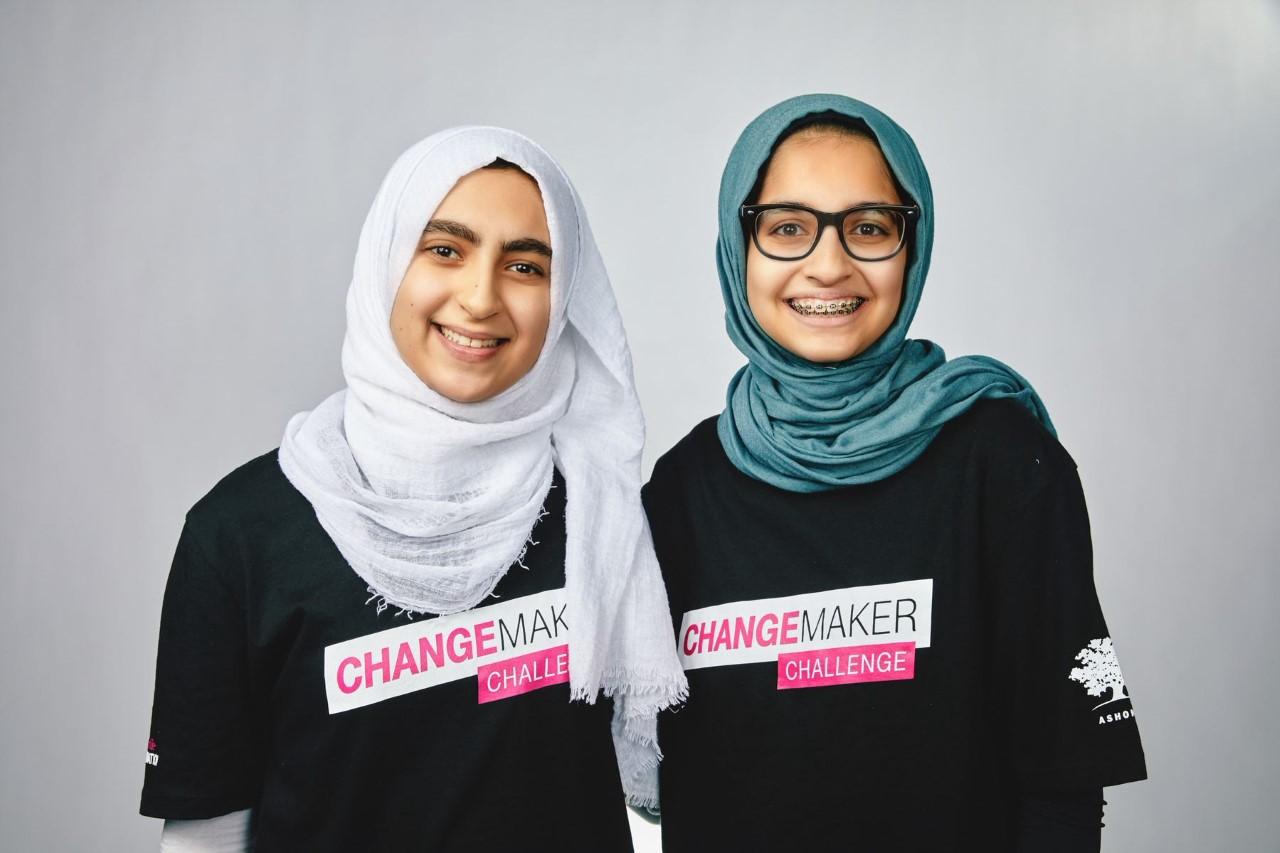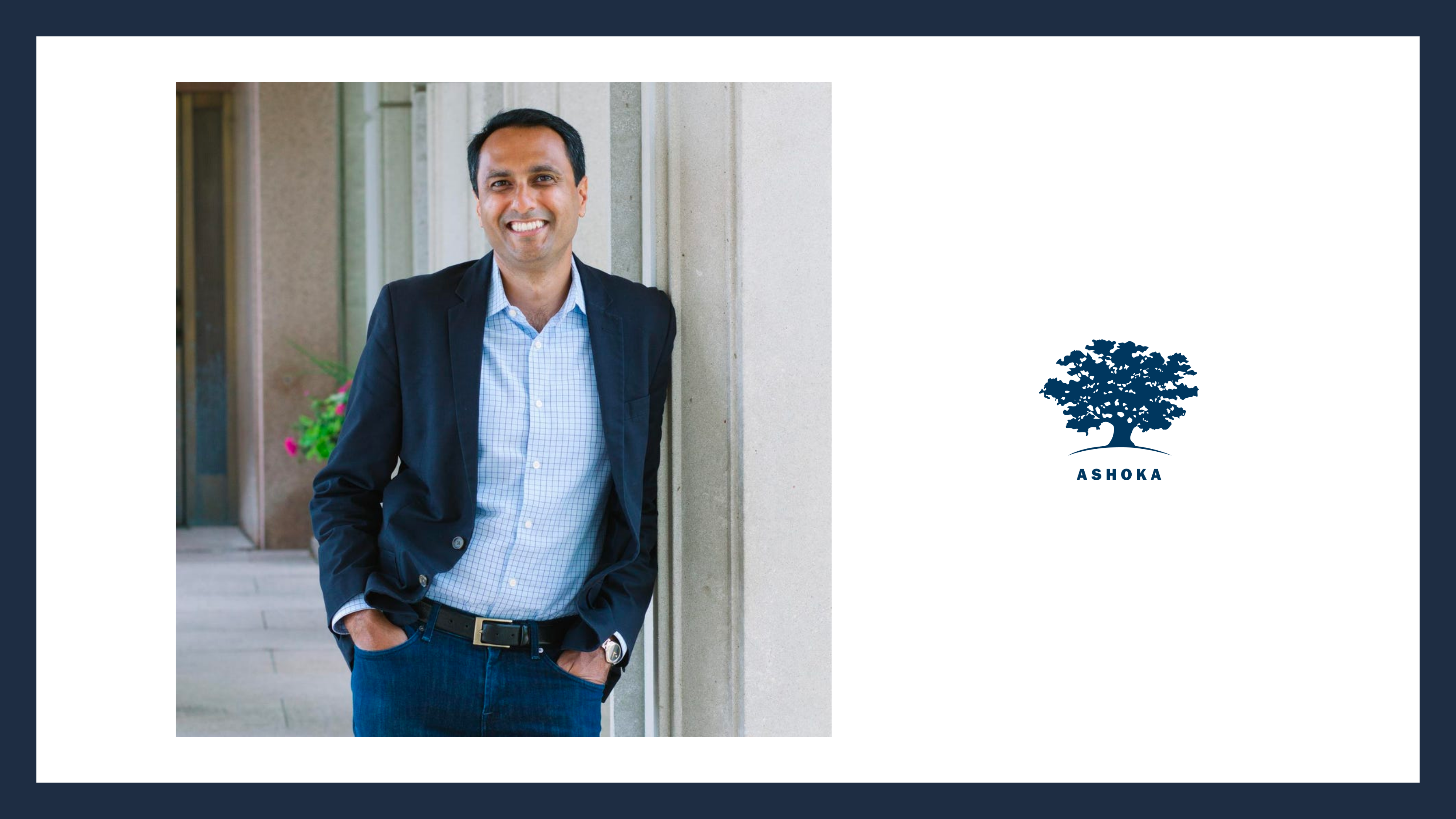
Salma Kamni with her team member, Anum Ahmad, at the 2019 T-Mobile Changemaker Challenge Lab
By Manat Kaur
When 17-year-old Salma Kamni encountered religious intolerance and Islamophobia in her own community in Chicago, Illinois, she took action by starting Converge Interfaith, an organization to promote acceptance and interfaith discussion. She aims to create “a global community that is aware and accepting of other religions.”
Salma experimented to refine the idea, starting with in-person workshops before taking the initiative online. Today, Converge hosts podcasts that feature two people of different religious identities discussing how they approach a given topic, and publishes columns that address modern issues through different religious lenses. Converge also continues to host in-person events to help youth promote acceptance in their own communities.
Ashoka Young Changemaker Manat Kaur spoke with Salma to learn more about her changemaking journey and the first steps she took to start her project.
MK: What is Converge Interfaith’s mission?
SK: Converge is an organization that provides a platform for interfaith discussion to ultimately minimize religious ignorance. The goal is to create a global community that is aware and accepting of other religions despite not interacting with them physically.
When did you first realize you had to take action, and how did you come up with your idea?
“Towel-head!” “Your country smells like a zoo.” “Terrorist!” I was desensitized. I shrugged those comments off. However, when my local mosque received bomb-threats online, I truly began to see my town. My diverse community, dubbed “Little Palestine,” was less than 5 minutes away from the neighboring Christian community. They avoided each other like the plague, and the dynamic is also seen at school. From calling areas where Muslims hang out “camel corners” to mocking shouts of “AllahuAkbar!” from my peers, I felt deeply saddened by the daily intolerance I encountered. I wondered, why is there a divide?
I came up with two answers: One, no one is initiating discussions about our similarities. Second, the media misrepresents religious communities. Propelled by fear, in combination with my love for discussion, I created Converge Interfaith to help both my community and people globally.
What was your first step?
I began by laying out by asking myself three questions: 1) Who did I want to impact? Why? 2) Why is my project necessary right now? 3) Will my project be necessary in the future?
I then laid out my goals for Converge. After answering all of those questions, I brainstormed for the best way to maximize my impact with Converge and brought it online.
How did you feel when you were starting out?
The entire process was (and still is!) nerve-wracking. I’m dealing with such a touchy issue. Developing my team in the early stages also helped a ton and it allowed me to bounce ideas around and see what would be most effective.
How did you start implementing your idea?
My first experience doing interfaith work was freshman year of high school. It was World Hijab Day, and the Muslim Student Association that I was part of gave students the opportunity to wear Islamic clothing such as headscarves for the girls and caps for the boys. It opened my eyes to how putting in the effort for interfaith relations has such important results!
Using my learnings, I started implementing Converge simply through community-based workshops. I hoped I could bring together people in my community through discussions and help them find similarities with each other.
But my community was not the only community with religious intolerance. I saw news about synagogues burning, shootings at mosques, and temples being desecrated. I thought of ways to solve the issue that would reach the most people as possible and came up with the idea of using the internet as a tool to expand the mission of Converge.
What obstacles did you face and how did you overcome them?
A huge challenge was actually lacking self-confidence. Questions like, “why do you think you can even make a difference?” and “people out there are already trying to solve the issue, why should you?” and “do you really think this work will make a difference globally?” plagued my mind and hindered my progress. I still haven’t completely gotten over those insecurities, but now I see that any work I’m putting into building interfaith relations, even by a tiny bit, is a change in the world nonetheless.
What advice would you give to other young people who want to make change but don’t know where to begin?
Find an issue in yourself or your community. Either support others who are working on solving that issue, or, if you can’t find anyone in your community working on that issue, lead it yourself.
Who else supported you throughout your journey?
My early team members! All of them are so patient, kind, and humble, and I have no idea how to thank them all. I’ve always felt like I’ve had a support system at my back willing to help out whenever necessary, even though they might not realize it. Shoutout to Anum Ahmad, Jordana Hozman, Yousef Ahmed, DaiGianna Williams, Jed Quiaoit, and Aaishah Elghobashy, who’ve been there since the beginning!
The interview has been edited for length and clarity.
-
The First Steps series, founded by Ashoka Young Changemaker Manat Kaur, aims to demystify changemaking and show how anyone can start making a change. Follow Ashoka to learn more about #EveryoneAChangemaker and #LeadYoung.


